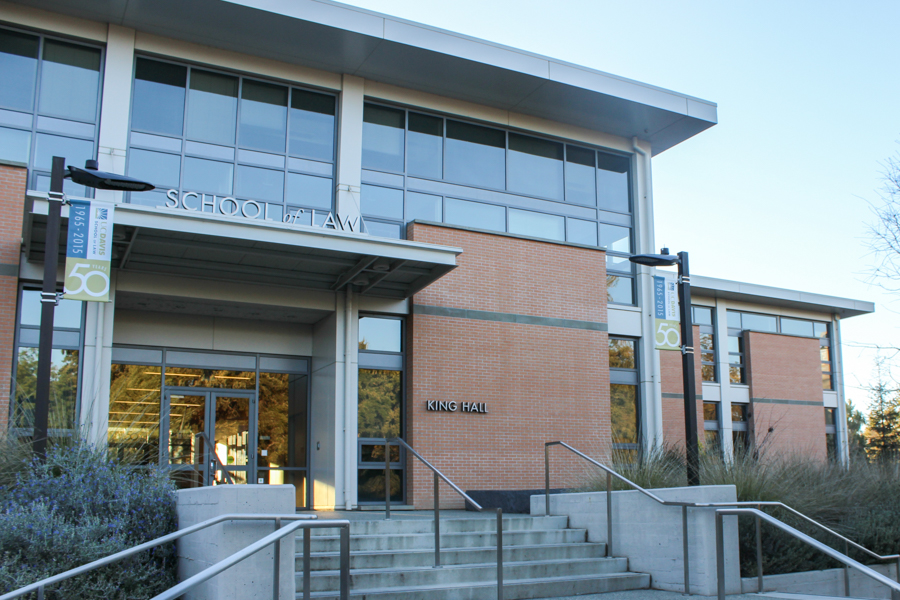The financial responsibilities of the student government are to be taken over by King Hall administration following the March 24 decision
By RIVERS STOUT— campus@theaggie.org
UC Davis suspended the Law Student Association on March 24 for passing legislation that divested from Israel-connected companies and speakers. The constitutional amendment, passed by the LSA board last month, implemented Boycott, Divestment and Sanctions policies in support of Palestine. The funds of the government for King Hall’s approximately 600 students have since been put under the control of UCD Law School administrators.
“[The March 24] decision follows the vote by LSA, the law school student government, to knowingly violate University of California policy by seeking to implement a discriminatory resolution intended to boycott people or entities with ties to Israel,” a university spokesperson told The Aggie in a statement. “UC policy requires student government organizations to support activities on a viewpoint-neutral basis. UC Davis is committed to providing an environment free of discrimination, harassment, antisemitism and other forms of hate.”
Shasun Sulur, a second-year graduate student in the UC Davis School of Law and former external vice president of the LSA who was ousted from their position as of the suspension, said that they had pushed for administrators to make the suspension more public.
“The UCD chancellor and King Hall administration dissolved our student government and we lost our control to allocate funds, meet and vote,” Sulur said.
“A few members of the LSA were on a call with the [King Hall] Dean of student affairs and the Vice Chancellor,” Sulur continued. “We demanded that the Law School give notice to the school. The constitutional amendment was supported by 16 student groups and 100 students on campus. [They] casually remarked this would be the only notice students would get.”
Later, law school administration sent an email informing students that the LSA was being suspended and their funds seized.
“King Hall has a long history of student input into administration decision-making,” School of Law Dean Jessica Berg wrote in the email. “We will continue to work with our students to ensure meaningful representation continues, while respecting and upholding the policies of the university and local, state and federal laws.”
Sulur said that the LSA had been expecting repercussions for the constitutional amendment, as university and law school administrations had stated as much, but they had yet to actually implement the legislation. Due to internal conflict, implementation of the boycott had been delayed until after spring break.
Sulur also said that in a meeting with the senior assistant dean of student affairs, LSA representatives were denied the ability to appeal the decision. They were also denied a request for a formal hearing as to why the LSA was being suspended.
The National Lawyers Guild (NLG) chapter at UC Davis, of which Sulur is a member, released a statement on March 28, criticizing UCD’s suspension.
“This suspension strips LSA of their governing status,” the statement reads. “Yet the administration still expects LSA board members to distribute funds, plan student events, spend thousands of their personal funds and support student organizations, continuing to provide students’ free labor to the administration without the power to control our own student funds or implement the BDS policy.”
The LSA’s funds primarily went to student organizations to pay for events such as speakers, career fairs and culture weeks. Faculty appointment representatives, policy representatives and graduate student representatives were also part of the LSA, though the future roles of these events and positions is unsure.
Students at King Hall will continue to pay fees for student activities, which are $30 a semester and total to some $36,000 this year.
“Rather than support students in implementing a democratically-passed amendment to our government’s bylaws dictating how we want our fees to be used, the administration has assumed control over our funds without providing any avenue for students to opt out of the fees,” the NLG statement said.
The NLG statement continued, “This extreme response by the law school administration and Chancellor Gary May is a clear message to students that freedom of speech does not include speech supporting Palestine, which is instead actively targeted for retaliation.”
NLG went on to claim that Chancellor Gary May’s position in Leidos, a defense contractor and engineering company, introduced a clear conflict of interest resulting in poor protections for students organizing for Palestine.
In a statement released three days prior to the suspension, May addressed concerns over recent pro-Palestine demonstrations.
“We’ve received complaints from concerned community members about recent student activities, including the Students for Justice in Palestine demonstration on March 11,” the memo read. “I want to state as strongly as possible that we will not tolerate hatred against any individual or group, or any activities directed at any individual or group in ways that violate UC policy.”
“This [suspension] is a clear continuation of King Hall’s and Gary May’s silencing of Palestinian speech and ignoring harassment,” Sulur said. “We’re asking that King Hall and the Chancellor allow us to implement our constitutional amendment that we democratically and constitutionally passed to have a say where our fees are spent, that’s more aligned with the namesake of our school.”
It is unclear whether this decision will affect ASUCD, the campus’ undergraduate student government, which passed similar legislation last year.
Written by: Rivers Stout— campus@theaggie.org










